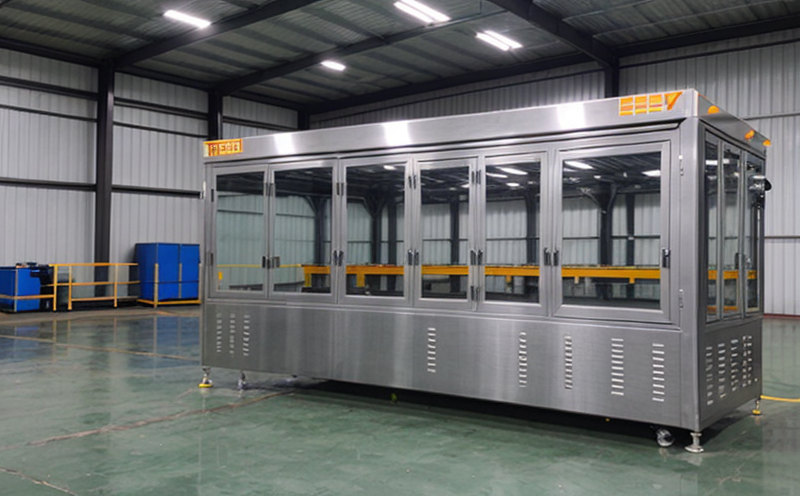ASTM D4145 Flexibility of Coatings on Metal Sheets
The ASTM D4145 test method is widely recognized as a standard practice for determining the flexibility, or bendability, of coatings applied to metal sheets. This testing procedure is particularly relevant in the packaging industry where metal-based materials are used extensively due to their durability, strength, and corrosion resistance.
The primary purpose of this test is to ensure that the coating on metal substrates remains intact under bending conditions, which is crucial for the performance and longevity of packaged products. The test involves folding a sample according to specific dimensions outlined in ASTM D4145, typically 90 degrees, and evaluating whether any cracking or delamination occurs at the bend.
The methodology described in ASTM D4145 emphasizes the importance of accurate specimen preparation, which includes cleaning the metal surface with appropriate solvents and ensuring that all coatings are fully cured before testing. The test setup also requires a specific bending fixture to achieve consistent results across multiple samples. This ensures that any observed failures can be attributed to coating properties rather than experimental variables.
The significance of this test cannot be overstated, especially in industries where the integrity of the packaging plays a critical role in protecting contents and ensuring product quality throughout storage and transportation. For instance, in food packaging, maintaining the flexibility of metal coatings helps prevent damage during handling, which could lead to contamination or spoilage.
Compliance with ASTM D4145 is essential for manufacturers seeking to meet industry standards and ensure consistent product quality. By adhering to this standard, companies can demonstrate their commitment to quality control and regulatory compliance, thereby enhancing customer trust and satisfaction.
The flexibility test is just one part of a broader suite of tests that form the basis of metal packaging quality assurance programs. Other common tests include tensile strength, elongation, and impact resistance, all of which contribute to a comprehensive evaluation of the materials used in packaging applications.
In summary, ASTM D4145 serves as a critical tool for ensuring that coatings on metal sheets meet the necessary flexibility requirements, thus supporting the overall quality and integrity of packaged products. This test is particularly important in sectors such as food, pharmaceuticals, and electronics, where protection against environmental factors like moisture and mechanical stress is paramount.
Industry Applications
- Food Packaging: Ensures the integrity of metal coatings during storage and transportation, preventing contamination or spoilage.
- Pharmaceutical Packaging: Maintains the protective barrier against moisture and chemicals that can affect drug stability.
- Electronics Packaging: Protects sensitive components from physical damage during packaging and handling processes.
- Petroleum Products Packaging: Enhances the durability of containers used in harsh environments, ensuring product integrity.
The flexibility test is essential for these applications because it ensures that coatings on metal substrates can withstand the rigors of real-world conditions without compromising the performance or safety of the packaged goods. By incorporating ASTM D4145 into their quality assurance protocols, manufacturers can enhance the reliability and shelf life of their products.
Eurolab Advantages
At Eurolab, we pride ourselves on offering comprehensive metal packaging testing services that go beyond compliance with industry standards. Our state-of-the-art facilities and expert staff ensure that every test is conducted with precision and repeatability.
- Accurate Specimen Preparation: We follow ASTM D4145 closely to prepare specimens in a manner that ensures consistent results.
- Consistent Testing Environment: Our controlled laboratory conditions minimize the influence of external factors on test outcomes.
- Comprehensive Reporting: Detailed reports are provided, offering insights into not only compliance but also areas for improvement and opportunities for product enhancement.
- Expert Personnel: Our team consists of experienced professionals who stay updated with the latest developments in testing methodologies and standards.
By choosing Eurolab, you can be confident that your metal packaging products will undergo rigorous testing that not only meets but exceeds industry expectations. This commitment to quality ensures that your products are reliable, safe, and meet customer demands.
Use Cases and Application Examples
The ASTM D4145 test is particularly useful in the following scenarios:
- New Product Development: During the early stages of product development, this test helps identify potential issues with coating flexibility that could affect packaging performance.
- Batch Quality Control: It allows for regular checks on production batches to ensure consistent quality and adherence to specifications.
- Supplier Evaluation: By conducting ASTM D4145 tests, companies can evaluate the reliability of their suppliers' metal packaging materials.
For example, a food manufacturer might use this test during product development to ensure that new coatings on metal cans will not crack or peel under typical bending conditions. Similarly, an electronics company may perform these tests as part of regular quality control processes to maintain the integrity of their packaging throughout the supply chain.





